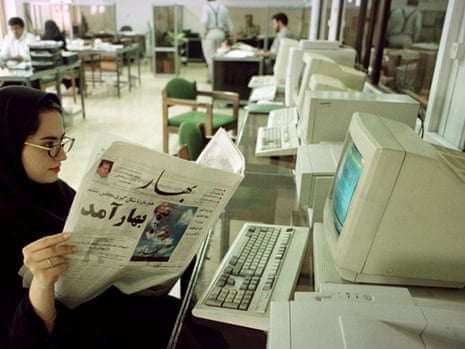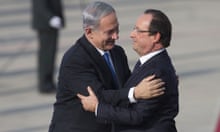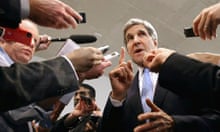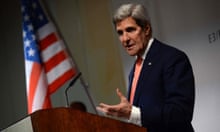The shutdown of a reformist daily last week has led some Iranian journalists to question how committed the administration of new president Hassan Rouhani is to greater freedom for a long-fettered press. This past Monday, Alaeddin Zohourian, chairman of the state media supervision council, announced that the Bahar newspaper “has been suspended and its dossier has been referred to the judiciary for an inquest.”
Zohourian said the decision was based on the council’s review of a 23 October article written by religious-nationalist activist Asghar Gharavi, of the Isfahan branch of the Freedom Movement of Iran. Founded in 1961, the movement played a central role in the opposition to the Shah and in the 1979 revolution that overthrew him; as the conservative clerical establishment around supreme leader Ayatollah Ruhollah Khomeini accrued power, the party’s influence waned and it has been officially banned since 2000.
Gharavi’s article, published on the occasion of Eid al-Ghadeer Khumm, the anniversary of the Prophet Muhammad’s naming of Imam Ali as his successor, appeared to question whether the celebrated event actually took place:
"It is not a heavenly prophet’s responsibility to specify a successor to himself, or khalif, [an act] known as “nassab”. As the prophets, and especially the Great Prophet, were sent to free mankind of all its yokes, constraints, ignorance, slavery, and serfdom, such an appointment or selection itself suggests the denial of freedom and a type of serfdom and slavery. It thus invalidates the goal of the appointment of the Prophet of Islam, as expressed in verse 157, al-A’raf [Qur’an sura 7]. On this basis, the Prophet would certainly not undermine the mission for which he was appointed."
As a political analyst told Tehran Bureau, “This article aims at the very foundation upon which the Shia sect was constructed, the principle of Imam Ali’s succession on al-Ghadeer Khumm to His Highness, Muhammad.”
A special report in Kayhan, the country’s leading right-wing daily, claimed that Gharavi had cooperated with the Shah’s infamous security and intelligence service, SAVAK, during the prerevolutionary period. The report went on to link the offending article with another, more recent era that Iranian principlists – conservative adherents to the supreme leadership system – also regard as benighted: the reformist administration of President Mohammad Khatami, 1997-2005. According to Kayhan, the “attempt to deny the imamat [spiritual leadership] of the guardianship of the emir of the believers, God’s blessing be upon him, and this on the approach of the Grand Eid of Ghadeer, recalls the vilified acts of the reformist period. Most people have not forgotten.”
Ayatollah Hossein Nouri Hamedani, who has a substantial following as a marja – source of emulation –joined in the condemnation of the article, asking, “Why should a newspaper permit itself the temerity and audacity to insult and malign sacred religious beliefs, the Ghadeer, the imamat, and the guardianship [of the supreme leader]?”
A journalist who covers politics for the Shargh daily told Tehran Bureau, “The fact is that the article has been truly provocative. I can’t imagine why Bahar published such a piece. It comes across like something that could be published in a country with widespread press freedom, such as Denmark. No matter how liberal a government is in power in Iran, the publication of such an article brings pressure. . . . It’s obvious that Kayhan and the aggressive [conservatives] relish the opportunity to exert heavy pressure upon reformist papers.”
While the Media Supervision Council was conducting its inquiry, Bahar published an item that sought to extenuate the paper’s transgression and ameliorate its punishment. According to the item, Gharavi’s article “reached the editorial staff in the last minutes of the day, and was published in the rush of deadlines, in haste and without sufficient care.” The failure to exercise proper editorial oversight, it said, occurred within a context of “the intent to exalt and venerate the Ghadeer commemoration.”
Stating that they would voluntarily suspend publication, Bahar’s editorial directors formally requested a pardon for giving the article a venue, and asked for the opportunity to publish a series of pieces that would refute Gharavi’s assertions. These measures were unsuccessful in staving off the official suspension, which was affirmed by Ali Jannati, Rouhani’s minister of culture and Islamic guidance. Jannati stated that the article “misrepresented the history of Islam [and] has played a role in exacerbating religious conflicts.”
The government’s handling of the matter has evoked expressions of despair among journalists and media activists who doubt the president’s ability to follow through on his pledges of greater press freedoms and other civil liberties. “It's truly ridiculous," said one Bahar reporter. "Instead of criticizing the suspension of a newspaper, Mr Rouhani’s government backed away. It is a shame that we are out of work and he talks sweet to keep his base secure.”
The media supervision council has seven members: three from the parliament, judiciary, and Qom scholars; the other four are selected, directly and indirectly, by the cabinet – the minister of guidance, or his fully authorized representative; a university professor selected by the minister of science; a representative of the high council of cultural revolution, whose director is the president himself; and a representative of the newspaper guild, who currently happens to be the vice minister of media affairs.
“So it is clear that the government could have prevented this shutdown," explains a political analyst in Tehran. "But it has not found a reason to get involved. Why? Because the issue is sensitive and a bright red-line. Government opposition to the shutdown could also be seen as supporting the questioning of the political foundation of Ayatollah Khamenei. The Bahar article claims that Imam Ali was more of a spiritual leader than a political one. In the Islamic republic, Ali is considered to be the jurist guardian, considered to be the successor to all prophets. Thus the article was indirectly questioning the legitimacy of the position of Iran’s supreme leader.”
On Wednesday, 30 October, Jannati backed off somewhat. According to the Iranian Students News Agency, he expressed regret over Bahar’s closure and stated, “In principle, the Ministry of Guidance and Islamic Culture is not looking to suspend any newspaper, and in our view there are other avenues aside from suspension by which laws can be enforced, and if a person has transgressed, their breaches can be examined.”
The ISNA reporter asked, by way of analogy, whether a university should be suspended if a student violates a law. Jannati responded, “No, that should not happen.”
“Can you promise us that there will be a downward trend in the suspension of newspapers?” the reporter asked.
“Yes, it shall be thus,” replied Jannati.
Additional controversy has swirled around statements made by Mohammad Reza Aref, the sole explicitly reformist candidate allowed on the June presidential ballot, to the closure of Bahar, the only newspaper in Iran to openly back his campaign.
As quoted by Fararoo, the website associated with Tehran mayor Mohammad Bagher Ghalibaf, Aref declared, “Publication of this article, and especially at the dawn of the anniversary of al-Ghadeer Khumm, due to the newspaper executives’ negligence has caused discomfort in ecclesiastical circles, and especially among Ali’s devotees. I myself, after reading the article, was deeply affected.” He cautioned, “The reformist media have to act wisely to not provide any excuses to the currents that are waiting to overwhelm the reformist waves.”
According to Fararoo, “Aref is now dissociating himself from the paper although Bahar, in apparent collusion, carried the news about him during the presidential campaign margin to margin. It is rumored that at the time 55% of the shares of the paper belonged to Hamid Aref, Mohammad Reza Aref’s son.”
Reacting to the paper’s suspension, a Bahar staff reporter left a post on his Facebook page in which he reflected on the many press closures in recent years. “Whenever a newspaper was shut down, the [Bahar] building became a safe haven in which to express our heartaches. They were opportunities to sit behind the same desks with your buddies and let your sorrows ride off on the back of long-winded chats. But with having to vacate the Bahar building, they even took away this little respite.”
As for the paper’s erstwhile paragon, the reporter wrote, “That Aref and his public relations [team] have added insult to our injury shall be remembered.”
In an interview with Tehran Bureau, a Bahar staff reporter said of Aref, “It causes regrets when we were the only reformist publication that supported him during the election. And now, in order to make sure he gets votes in the tenth parliamentary elections [in 2016], he has broken away and is singing, ‘Who did it, who was it, it wasn’t me’” – a traditional children’s ditty. “It is good that the reformists insisted that he pull out of the election in favor of Rouhani. He is so spineless.”
A senior journalist at the reformist Neshat daily, relaunched in September after a ban that lasted several years, downplayed the significance of the Bahar case. “I don’t view the situation as negative,” he said. “Nor am I saying that all will march forward wonderfully. But we have to concede that the press conditions have seen a real transformation in just the last three months.
“There will be hurdles in the way, but I disagree with those who say that this is the start of press suspensions in the Rouhani era. No, the Bahar situation is an extraordinary case. In 2000 they closed a paper for publishing a release critical of Hamas, [another] just for criticizing a ministry. Such things won’t be happening now. I am optimistic for the future.”









Comments (…)
Sign in or create your Guardian account to join the discussion